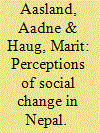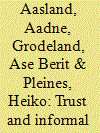| Srl | Item |
| 1 |
ID:
190474


|
|
|
|
|
| Summary/Abstract |
Focusing on the local community level, this study draws on representative survey data to examine how Ukrainians perceive social cohesion on the basis of objective and subjective criteria. Building on Chan et al.'s operationalisation of social cohesion, we use factor analysis to identify four dimensions of social cohesion: social engagement, connectedness, civic participation and intergroup concordance. Although we find no differences in assessments between the various regions of the country, social cohesion appears stronger in voluntarily formed amalgamated territorial communities compared to other territorial units. We discuss how and why Ukraine differs from other societies as to social cohesion features.
|
|
|
|
|
|
|
|
|
|
|
|
|
|
|
|
| 2 |
ID:
104033


|
|
|
|
|
| Publication |
2011.
|
| Summary/Abstract |
Whereas it has been well documented that Nepal has experienced progress in economic and human development over the last decade, this article examines the impact of caste, ethnicity, religion and region on perceptions of socio-economic and socio-cultural change. Based on results of the Center for Nepal and Asian Studies (CNAS) Social Exclusion Survey of 2890 households, we find that regardless of background characteristics, a majority of people report socio-economic improvements, more ethnic integration and less discrimination. Although traditionally excluded caste, ethnic and religious groups are somewhat less likely to report social improvements than more privileged groups, two models of socio-economic and socio-cultural change show that such group differences disappear when controlling for socio-economic and other background characteristics.
|
|
|
|
|
|
|
|
|
|
|
|
|
|
|
|
| 3 |
ID:
110024


|
|
|
|
|
| Publication |
2012.
|
| Summary/Abstract |
The article examines patterns of generalised and institutional trust among elites in East Central Europe, South East Europe and the West Balkans. It enquires into the extent to which such trust can predict elite perceptions and behaviour concerning informal practice. The article builds on surveys of elite representatives in seven post-socialist states. Survey findings are complemented with and illustrated by findings from qualitative in-depth interviews. It emerges that neither institutional nor generalised trust can serve as strong predictors of informal behaviour or of informal practice. The linkages between trust and informal practice are then discussed with reference to elites' own experiences with the past legacy and post-socialist society.
|
|
|
|
|
|
|
|
|
|
|
|
|
|
|
|